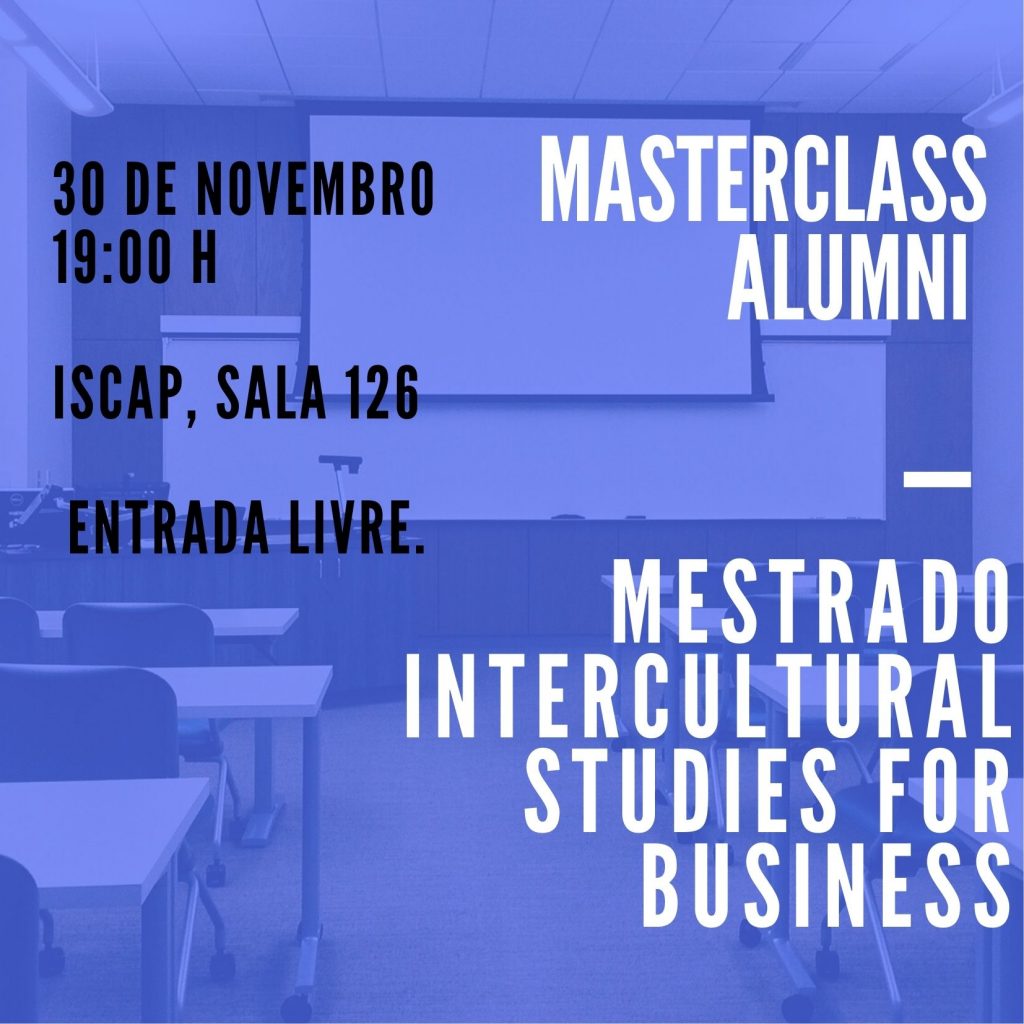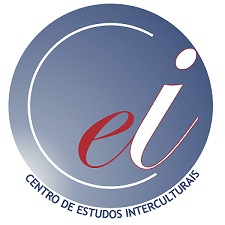
On 30 November 2021, Tuesday, a Masterclass will be held by the students of the MA Intercultural Studies for Business.
The Masterclass will take place in room 126, at 19:00 in ISCAP
Speakers:
Ana Margarida Silva | Moving Mountains: ADIRAM as the first step
This internship report was carried out in the scope of the Master’s degree in Intercultural Studies for Business, lectured at the Porto Accounting and Business School, Polytechnic of Porto. The curricular internship took place between February and June 2021, in the Association for the Integrated Development of the Aldeias de Montanha Network (ADIRAM), integrating the Project Aldeias de Montanha.
The development of local communities is extremely important to avoid the rural exodus evident in the interior of Portugal which has been a difficult challenge to control over the last few decades. Consequently, it is necessary to enhance the resources and endogenous wealth existing in these territories in order to preserve them.
With this in mind, this internship report aims to analyze the nature of the work developed through ADIRAM in the Aldeias de Montanha, located in Serra da Estrela and Serra da Gardunha. Therefore, demonstrating that it is essential to value their territories and their communities because they have a lot to offer, especially in terms of tourist attraction. The report further describes the tasks performed during the internship and explores three case studies in order to examine real life settings.
The results presented demonstrate the importance of empowering local communities and valuing their respective territories. Besides, although the territories in analysis are considered local territories, there is a clear expansion from the local to the global, represented in an interaction of local environments and cultures with global flows. Thus, the concept of “glocal” and the process noun “glocalization” should be taken into account when searching for new ways to develop such territories and their communities.
Bionote:
Ana Margarida Silva is a graduate in Modern Languages, from the Faculty of Letters of the University of Coimbra, with a Master’s Degree in Intercultural Studies for Business, at ISCAP-P.Porto. In 2021, she became a Junior Researcher at CEI (Centre for Intercultural Studies). Her research interests involve street art, cultural and creative industries, as well as social innovation and sociocultural entrepreneurship.
Juliana Reis Ferreira The new Portuguese wave of emigration: A case study in the canton of Vaud (Switzerland)
Nowadays, migration is one of the key topics being discussed worldwide. Migration is a complex concept that can be evaluated from different perspectives and areas. Emigration and the necessity to leave the country for a variety of reasons is an integral part of Portugal and of the Portuguese culture and society. Thus, this dissertation aims to better understand the emigration of highly skilled Portuguese people to Switzerland, more specifically to the canto of Vaud and the city of Lausanne. Moreover, it aims to better understand the evolution of the Portuguese community living in this part of Switzerland. It also has the purpose of understanding if and how the adaptation of this new generation of emigrants differs from the integration of past generations.
Therefore, to achieve its purpose, a literature review about the topic of the Portuguese emigration to Switzerland and similar subject matters was conducted. In addition, interviews were also carried out with Portuguese emigrants with higher education currently living in the canton of Vaud. With the help of these two methods, it is possible to conclude that alterations have occurred in the Portuguese community living in the canton of Vaud. Thus, this new generation of Portuguese emigrants has a new set of skills and perceptions that previous generations of Portuguese emigrants did not have. They also have new expectations, projects and ideas for their experiences as emigrants in Switzerland.
Bionote:
Juliana Reis Ferreira is a graduate in Foreign Languages and Cultures by ESE (Polytechnic of Porto). In 2019, she did an internship in the Alliance Française of Porto. Currently. She is attending the master’s degree in Intercultural Studies for Business at ISCAP (Polytechnic of Porto). Her main scientific research interests focus on migration, the Portuguese emigration and migrations’ socioeconomic and cultural consequences.
Luana Marques Elysian: Get your cultural game on
The football world is becoming increasingly diversified, due to the intertwining of cultures. This is the outcome of evolution, globalization, and migration, while also being connected to the sport’s new business encounters. Modern-day football squads are the ultimate example of a multicultural bubble, with dissimilar cultures coexisting in a self-enclosed microenvironment. However, the tools provided to individuals facing odd cultural contexts are still lacking in many aspects, therefore the necessary intercultural competence is not achieved.
The current dissertation presents contemporary issues in the world of football, mainly related to culture, and other societal problems, through the simultaneous analysis of challenges and advantages faced by professionals to achieve a stable and possible balance between work-life. By identifying the core sociocultural issues, it offers a possible solution through an innovative business idea and concept with a main focus on the Portuguese context. The project
“Elysian: Get your cultural game on” intends to improve the intercultural integration and inclusion processes experienced by individuals in modern football, thus benefiting everyone involved. This dissertation presents not only the company and its purpose, but also the plans behind it, from its conception to its possible implementation.
Modern football culture encompasses key values such as equality, inclusion, and cultural diversity. Hence, it can perform as an educational tool and become a major influence on contemporary societies. Overall, the aim of this dissertation is to expose an emerging issue in the football world that has been widely neglected, thus generating a more active discussion. Football has the potential not only to improve itself but also everyone that follows it by being an example and playing as a game changer.
Bionote
Luana Marques is a junior researcher at the Centre for Intercultural Studies (CEI, ISCAP-P.PORTO), with a BA in Foreign Languages and Cultures (ESE-P.PORTO) and a MA in Intercultural Studies for Business (ISCAP-P.PORTO).
Her main scientific research interests focus on sociocultural entrepreneurship and innovation, with an emphasis on the relationship between culture and sports.
Marco Faria Transmission of Scientific Knowledge in the Digital Era: The Path to Open Science
The sharing of scientific knowledge has come a long way since secrecy in the medieval times. The internet era has deeply changed the practice of science, now more global than ever, and the way knowledge is disseminated.
The aim of this work is to analyse the impact of digital transformations from an historical and legal perspective, debate current challenges in the academia, and present Open Science as a systemic effort towards a more reliable, effective, and equitable knowledge system. Specifically, problems such as the ever-increasing oligopoly of academic publishers, and the misuse of the impact factor as an assessment method of research and researchers will be scrutinized.
Recognition and adoption of open research practices is growing, motivated by ethical, moral, and utilitarian arguments. The best practices to adopt Open Science in each of its four key areas (open access, peer-review, data, and code) will be addressed. Despite the compelling evidence on the benefits of such practices, they have not yet been widespread. These benefits will be discussed, as well as a number of intellectual property law questions. Thus, an overview of relevant intellectual property regimes will be provided. This work will likewise address the barriers to a transition to an Open Science research system, and suggest practices to researchers, institutions, and governments within existing frameworks – most notably, the efforts being pursued by the European Commission’s policies on Open Science and the UNESCO Recommendation on Open Science in an effort to outline an international framework for the transition;
Bionote:
Mestre em Estudos Interculturais para Negócios pelo ISCAP, P.PORTO, com a dissertação em ‘Transmission of Scientific Knowledge in the Digital Era: The Path to Open Science’, que analisa a partilha de conhecimento académico de uma perspetiva histórica e legal. É investigador júnior no Centro de Estudos Interculturais no ISCAP.

